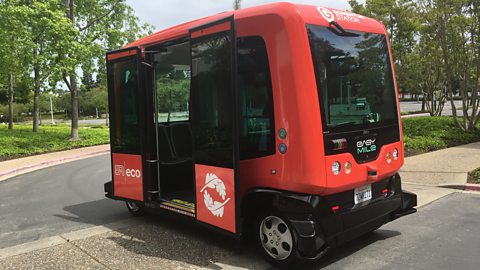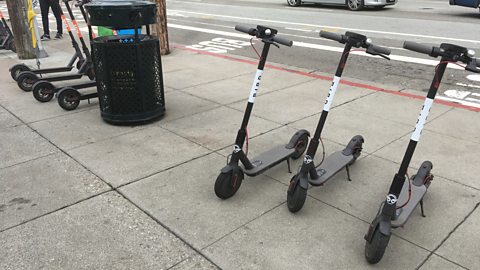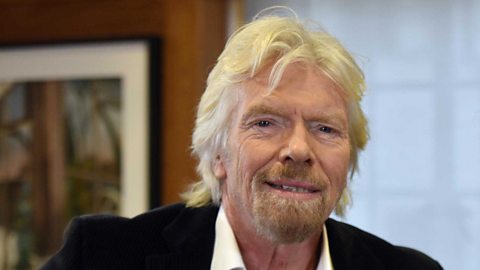Future Transport: ready for takeoff or overhyped?
In a special edition from California, You and Yours investigates the future of transport.
In 10 or 20 years, will we be travelling around in cars without drivers? Will we get to work in trains that glide on air and cover vast distances in minutes? Will we even be able to travel to space like tourists?
Here are the top five ways transport could be changing.

Driverless cars
Lots of companies are busy developing autonomous vehicles.
The idea began with the US military during the wars in Iraq and Afghanistan. To try and prevent American troops being killed or wounded by improvised explosive devices, the United States Department of Defence ran a competition for scientists to make a vehicle which drove itself. Since then the likes of Uber, General Motors and Waymo, which is part of Google, have all started developing them.
It's not without difficulty, earlier this year a self-driving Uber car crashed into a pedestrian who was crossing a busy road in Tempe, Arizona. The woman – 49 year old Elaine Herzberg was taken to hospital but later died. Uber suspended testing. Millions of pounds is now being invested in their development, including how to ensure they're safe.

What is the future of driverless cars?
Reilly Brennan on his investment of $20million in 24 driverless car start-up companies.
New power - batteries
Sales of electric vehicles are growing and experts believe that trend will continue because the fuel is cheaper, maintenance is lower and they create less air pollution. Although they can be a bit more expensive to buy than conventional cars, the cost is also expected to fall as battery costs drop. In the three year period from 2014 to 2016, battery costs fell by more than 50%.
The range of electric vehicles is also improving. That's important because motorists need to overcome ‘range anxiety,’ or fears that a battery cannot take them as far as a tank of traditional fuel. Some EV’s can now drive well over 300 miles on a single charge.
High speed rail
Hyperloop is a new kind of transport, where passengers are loaded into pods which can glide at speeds of up to 700mph down a low pressurised tube. The pod floats above the track using magnets, and moves using electric propulsion. They say it could get you from London to Edinburgh is less than an hour.
The Tech entrepreneur Elon Musk first proposed a line between Los Angeles and San Francisco for the price of bus ticket. He's created the Boring Company and is building a tunnel in Los Angeles to test the technology.
Richard Branson's Virgin Hyperloop One has built a 500 metre test track in Nevada and Hyperloop Transportation Technologies is building a prototype in France.

What is Hyperloop?
Samantha Fenwick investigates a new kind of transport which glides at speeds up to 700mph
On demand
You can already hire a bike straight off the street in many cities in the UK. It started with the Boris bikes in London. Now you can get dockless hire bikes too.
Found and unlocked with a few taps on a smartphone, they can be hired for an hour, day, or week - then locked up and left wherever the journey ends, rather than a special docking area.
You could soon be seeing dockless electric scooters too. Three companies - Lime, Bird and Spin - are running schemes where people can hire them straight off the street using a mobile phone app in the US.

The future of dockless electric scooters on demand
Jess Quayle on whether dockless electric scooters are the next big thing.
Space Travel
On the 11th May at the Kennedy Space Centre in Florida Elon Musk's SpaceX Company launched the Falcon 9 rocket. On board was Bangladesh's first communication satellite. It was the latest event in a new space race.
Elon Musk wants to send space tourists on a moon mission by the end of the next year, by 2022 he wants to land on Mars. He's not alone - Amazon boss Jeff Bezos is working on space missions too, and Sir Richard Branson told You and Yours he's currently training to become an astronaut!

Sir Richard Branson on training to become an astronaut
Sir Richard Branson on the new space race, and his own preparations for it.
More from Radio 4
-
![]()
You & Yours Future Transport
Trains, planes and autonomous cars - how will you be travelling around in 20 years' time?
-
![]()
Cava chameleon: Six sparkling wines well worth knowing?
Sparkling wine doesn't have to mean cork-poppingly expensive Champagne.
-
![]()
Eight reasons we fell in love with plastic
An exploration of the importance of plastic and how it came to pervade our lives.
-
![]()
Seven of the world's most infamous animal invaders
From mammals to molluscs, here are seven of the world's most troublesome animal invaders.




